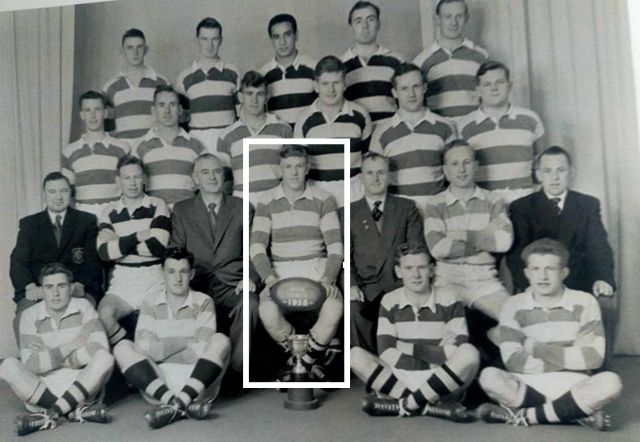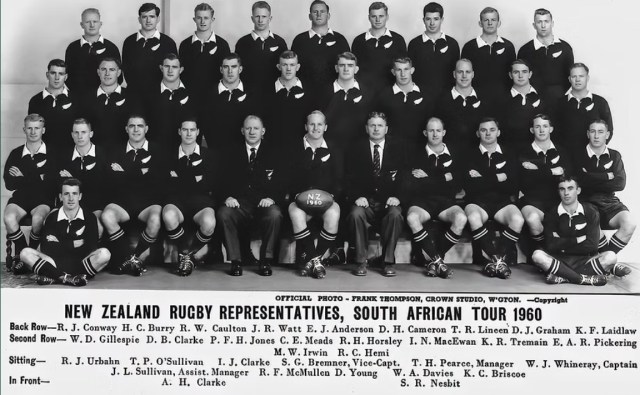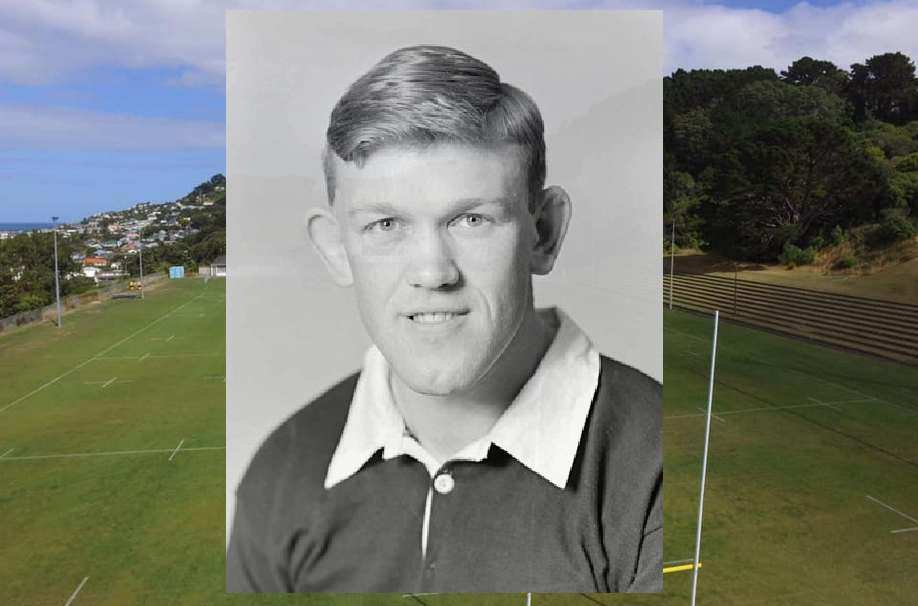A late bloomer, Ron Horsley also let his actions speak louder than his words.
In fact, Ron Horsley didn’t start playing rugby until he was 19.
His rise was rapid and the specialist lock quickly ascended the rugby ranks to the top Wellington Football Club Senior team, on to the Wellington representative side and then the All Blacks on two overseas tours in 1960 and 1963/64.
In his 2020 book Give ‘em the Axe! Commentator and author Keith Quinn wrote this of Horsley:
“In the early 1950s Ronald Horsley (“Horse”) first came to attention in the club’s Senior Second Division team. He was a tall, gangly youth, rather quietly disposed, even though he toiled strong in the turbulence of rugby’s boiler-room. In the end Horsley’s career brough honour to himself, his family, club, province and his country.”
By 1955, the Rugby Weekly was often mentioning Horsley in despatches. Such as this from 30 April 1955:
“University had no counter to Wellington’s Ron Horsley, who jumped impressively in lineouts. Horsley only took up rugby about four seasons ago and has made remarkable improvement.”
Three years later on 24 May 1958, the Rugby Weekly wrote that “Ron Horsley is undoubtedly the number one lineout and lock forward in Wellington at the moment.” An entry the following year praised him for always playing with “sustained vigour”.
That was the year he captained the Axemen to second place in the Jubilee Cup, behind University.
 Ron Horsley, highlighted, and the 1958 Wellington Axemen side.
Ron Horsley, highlighted, and the 1958 Wellington Axemen side.
Ronald Hugh Horsley was born in Wellington on 4 July 1932 and was educated at Miramar South Primary School and then Rongotai College.
The eventual 6′ 4-1/2″ (1.93m) tall and 16st. (102kg) Horsley joined the Wellington Football Club as a nineteen-year-old in 1952 for what would be his first taste of rugby.
He had been involved in athletics and harriers as a teenager and was involved with the Scottish Harrier Club.
He joined the Axemen’s third grade side, but by season’s end was playing in the Senior B (second XV) team.
Horsley was then elevated to the Axemen’s top side in his second season in 1953.
He first played for Wellington B in 1954, and again in 1955, before first making his mark in the top Wellington representative side in 1956. He carried this form over to representative rugby and soon became a valuable member of the provincial side.
He played four matches for Wellington in 1956, nine in 1957, 13 in 1958, eight in 1959 and 11 in 1960 and 1961 (away with the All Blacks in 1960).
He was in Wellington’s Ranfurly Shield team in 1956 and 1957, but came into his own the following season, missing just two matches. In 1959 he missed Wellington’s match against Great Britain, but played in several big provincial games.
In total, Horsley made 46 appearances at lock for the Wellington representative side.
Horsley played in All Blacks trials in 1958 and 1959 and also for a New Zealand XV.
In 1960 he made the All Blacks for the first time and was one of the finds of the tour to South Africa.
In his book, The All Blacks Juggernaut in South Africa, Ace Parker wrote that “In the early games, Horsley looked like being a permanent member of the so-called ‘Wednesday social side’, but made marked progress and when Peter Jones fell out of the reckoning filled one of the locking positions with credit in the second, third and fourth tests. Horsley used his height to advantage in the lineouts. For so mild mannered a person he could be surprisingly assertive on the field and was concerned in quite a few incidents.”
Noel Holmes in his 1960 tour book Trek out of trouble wrote about Horsley. “Without the faintest doubt, the most improved player on tour. Determined in the lineouts; conscientious as a lock; the scourge of all wrongdoers. Yet the quietest man off-field in the entire party.”
In South Africa he formed a partnership with fellow Wellington representative lock Nev McEwan, while Colin Meads was mostly at No. 8.
 Ron Horsley (second row, fifth from left, beside Colin Meads) and the 1960 All Blacks.
Ron Horsley (second row, fifth from left, beside Colin Meads) and the 1960 All Blacks.
A decade on from landing at the Wellington Football club, then 28-year-old Horsley moved with his family of four children to Palmerston North In 1962
Horsley moved to Palmerston North in his job as a hotel proprietor and joined the Kia Toa club, whom he later coached.
Horsley was immediately promoted to captain of the Manawatu provincial side and went on the represent his second province on 37 occasions in first-class rugby over three seasons 1962-64.
He also went on the 1963-64 All Blacks tour, but missed much of it as he was laid low with appendicitis for seven weeks of the tour and the player known as ‘Honest Ron’ missed a possible 14 matches and three tests, before making one more and what would be his final All Blacks appearance in Vancouver on the way home.
After retiring as a player, Horsley went on to serve as a selector for the Nelson (1966), Golden Bay-Motueka (1967–68) and Nelson Bays (1969–70) unions.
He was also on the Wellington Junior Advisory Board and was Wellington’s U19 selector 1974-75.
He was Chairman of the Wellington Football Club, and like his father Hugh he was honoured with life membership of the Wellington Football Club.
He was also heavily involved in Rotary. And became a Rotary District Governor in 1998-99.
Horsley retired to Taupo and then to Rotorua, where he passed away on 20 December 2007, aged 75.
REFERENCES:
Akers, Clive. New Zealand Rugby Register 1870-2015. New Zealand Rugby Museum, 2016.
Akers, Clive. Ron Horsley All Blacks Player Profile, online at:https://stats.allblacks.com/all-players/profile/Ron-Horsley-AB-610
Holmes, Noel. Trek out of Trouble. Whitcombe and Tombs Limited. New Zealand, 1960.
Quinn, Keith. Give ‘Em the Axe! 150 years of the Wellington Football Club. Wakefields Digital, Wellington, 2020.
Parker, A.C. The All Blacks Juggernaut in South Africa. Whitcombe and Tombs Limited. New Zealand, 1960.
Rugby Weekly – various publications 1950s.
Wellington’s Rugby History 1951-79. By Bob Fox, with assistance by Paul Elenio and Joseph Romanos (Evening Post) and Alex Veysey and Ian Gault (Dominion), with statistics compiled by Gordon Jackson (1951-68) and Alby Butterworth (1969-78). Tolan Printing Company, Wellington, 1979.
Like this:
Like Loading…
Related

